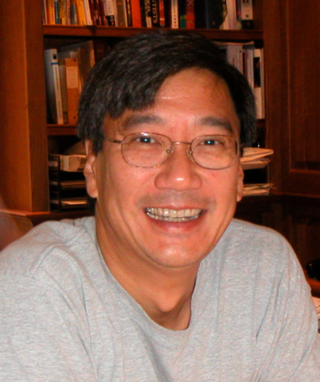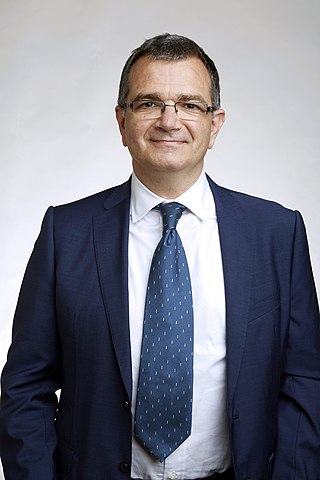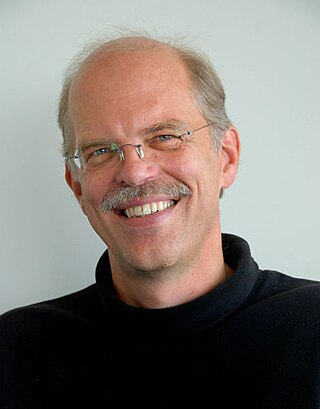Related Research Articles

Sir Gustav Victor Joseph Nossal is an Austrian-born Australian research biologist. He is famous for his contributions to the fields of antibody formation and immunological tolerance.

Peter Charles Doherty is an Australian immunologist and Nobel laureate. He received the Albert Lasker Award for Basic Medical Research in 1995, the Nobel Prize in Physiology or Medicine jointly with Rolf M. Zinkernagel in 1996 and was named Australian of the Year in 1997. In the Australia Day Honours of 1997, he was named a Companion of the Order of Australia for his work with Zinkernagel. He is also a National Trust Australian Living Treasure. In 2009 as part of the Q150 celebrations, Doherty's immune system research was announced as one of the Q150 Icons of Queensland for its role as an iconic "innovation and invention".

Rolf Martin Zinkernagel AC is a professor of experimental immunology at the University of Zurich. Along with Peter C. Doherty, he shared the 1996 Nobel Prize in Physiology or Medicine for the discovery of how the immune system recognizes virus-infected cells.

Sir Gregory Paul Winter is a Nobel Prize-winning English molecular biologist best known for his work on the therapeutic use of monoclonal antibodies. His research career has been based almost entirely at the MRC Laboratory of Molecular Biology and the MRC Centre for Protein Engineering, in Cambridge, England.

CD1D is the human gene that encodes the protein CD1d, a member of the CD1 family of glycoproteins expressed on the surface of various human antigen-presenting cells. They are non-classical MHC proteins, related to the class I MHC proteins, and are involved in the presentation of lipid antigens to T cells. CD1d is the only member of the group 2 CD1 molecules.

Richard Henderson is a British molecular biologist and biophysicist and pioneer in the field of electron microscopy of biological molecules. Henderson shared the Nobel Prize in Chemistry in 2017 with Jacques Dubochet and Joachim Frank. "Thanks to his work, we can look at individual atoms of living nature, thanks to cryo-electron microscopes we can see details without destroying samples, and for this he won the Nobel Prize in Chemistry."

TAP-associated glycoprotein, also known as tapasin or TAPBP, is a protein that in humans is encoded by the TAPBP gene.
Charles Alderson Janeway, Jr. was an American immunologist who helped create the modern field of innate immunity. A member of the National Academy of Sciences, he held a faculty position at Yale University's Medical School and was an Howard Hughes Medical Institute Investigator.

Philippa "Pippa" Marrack, FRS is an English immunologist and academic, based in the United States, best known for her research and discoveries pertaining to T cells. Marrack is the Ida and Cecil Green Professor and chair of the Department of Biomedical Research at National Jewish Health and a distinguished professor of immunology and microbiology at the University of Colorado Denver.

Peter S. Kim is an American scientist. He was president of Merck Research Laboratories (MRL) 2003–2013 and is currently Virginia & D.K. Ludwig Professor of Biochemistry at Stanford University, Institute Scholar at Stanford ChEM-H, and Lead Investigator of the Infectious Disease Initiative at the Chan Zuckerberg Biohub.
Jack Leonard Strominger is the Higgins Professor of Biochemistry at Harvard University, specializing in the structure and function of human histocompatibility proteins and their role in disease. He won the Albert Lasker Award for Basic Medical Research in 1995.
Hugh O'Neill McDevitt ForMemRS was an immunologist and Professor of Microbiology and Immunology at Stanford University School of Medicine.
Sir Gordon William Duff, is a British medical scientist and academic. He was principal of St Hilda's College, Oxford, from 2014 to 2021. He was Lord Florey Professor of Molecular Medicine at the University of Sheffield from 1991 to 2014.
Richard Anthony Flavell is an English molecular biologist, and Sterling Professor of Immunobiology, at Yale School of Medicine where he uses transgenic and gene-targeted mice to study Innate and Adaptive immunity, T cell tolerance and activation in immunity and autoimmunity, apoptosis, and regulation of T cell differentiation. He is an investigator at the Howard Hughes Medical Institute. In 2013, Flavell received the Vilcek Prize in Biomedical Science. In July 2016, Flavell received an honorary doctorate degree from the University of Hull. He is an honorary member of the British Society for Immunology.
Richard Olding Hynes is a British biologist, a Howard Hughes Medical Institute Investigator, and the Daniel K. Ludwig Professor for Cancer Research at the Koch Institute for Integrative Cancer Research, Massachusetts Institute of Technology (MIT). His research focuses on cell adhesion and the interactions between cells and the extracellular matrix, with a particular interest in understanding molecular mechanisms of cancer metastasis. He is well known as a co-discoverer of fibronectin molecules, a discovery that has been listed by Thomson Scientific ScienceWatch as a Nobel Prize candidate.

James Patrick Allison is an American immunologist and Nobel laureate who holds the position of professor and chair of immunology and executive director of immunotherapy platform at the MD Anderson Cancer Center in Houston, Texas. Allison is Regental Professor and Founding-Director of James P. Allison Institute at the MD Anderson Cancer Center.
Helen Kim Bottomly is an American immunologist and the former president of Wellesley College, serving from August 2007 to July 2016. Bottomly was the first scientist to become a president at Wellesley College. She has been a member of the American Academy of Arts and Sciences since 2009. She chaired the board of directors of the Consortium on Financing Higher Education and was a member of the advisory council of the National Institutes of Allergy and Infectious Diseases at the National Institutes of Health. In May 2018, she was appointed as the chair of the board of the trustees for the Fulbright University Vietnam, which she stepped down from in 2019.

Vincenzo Cerundolo was an Italian medical researcher who was the Director of the Medical Research Council (MRC) Human Immunology Unit at the University of Oxford, at the John Radcliffe Hospital and a Professor of Immunology at the University of Oxford. He was also a Supernumerary Fellow at Merton College, Oxford. He was known for his discoveries in processing and presentation of cancer and viral peptides to T cells and lipids to invariant NKT cells. Cerundolo died of lung cancer on 7 January 2020.

Jacques (Sjaak) Neefjes is a Dutch scientist who made breakthroughs in several research disciplines such as immunology, cell biology, chemistry, cancer biology, microbiology, and epidemiology. He is a professor at the Leiden University Medical Center. In 2020 he was one of four winners of the Spinoza Prize.
Mitchell Kronenberg is an American immunologist and the chief scientific officer at the La Jolla Institute for Immunology. He served as president of the institute from 2003 to 2021.
References
- 1 2 "Peter Cresswell, PhD, FRS" . Retrieved 20 December 2019.
- ↑ "Peter Cresswell, PhD". Howard Hughes Medical Institute. Retrieved 20 December 2019.
- ↑ "Peter Cresswell" . Retrieved 20 December 2019.
- ↑ "About the PNAS Member Editor" . Retrieved 20 December 2019.
- ↑ "NKT Therapeutics Broadens Scientific Advisory Board with Three New Appointments". 27 July 2009. Retrieved 20 December 2019.
- ↑ Rajendrani Mukhopadhyay (December 2012). "Meet Peter Cresswell, a new associate editor for The Journal of Biological Chemistry".
- ↑ "Peter Cresswell, Ph.D." Cancer Research Institute. Retrieved 20 December 2019.
- ↑ "IOM Elects 65 New Members, Five Foreign Associates" . Retrieved 20 December 2019.
- ↑ "Peter Cresswell". The Royal Society. Retrieved 20 December 2019.
- ↑ "Three join National Academy of Sciences". Yale Medicine. Summer 2001.
- ↑ "Royal Society recognizes excellence in science". 9 June 2009. Retrieved 20 December 2019.
- ↑ "Member directory Chapter C" (PDF). American Academy of Arts and Sciences. Retrieved 20 December 2019.